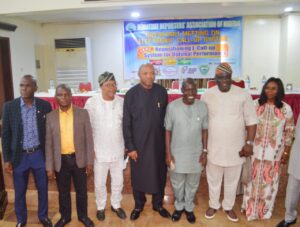
Joyce Mmereole Okoli
In a recent conference organized by the Maritime Reporters’ Association of Nigeria (MARAN), experts emphasized the necessity of providing legal backing for the Truck Transit Park (TTP) operations, aimed at addressing traffic challenges at Lagos ports.
Mr. Kingsley Anaroke, the Publisher of MMS Plus newspaper, urged the enactment of a Bye-Law or Ordinance within the Apapa municipal jurisdiction to support the Electronic Truck Call-up system.
Anaroke while speaking at the event themed: “Repositioning ETO Call-up System for Optimal Performance,” noted that it will be a misconception to assume that the process had legal backing.
“To back this proposition up with legislation, the electronic call –up system operates within the Apapa municipal jurisdiction as such all that is needed is to enact a Bye- Law or an Ordinance which is the responsibility of the elected Councilors to carry out to give it effect. Mobile courts are presided over by Magistrates.”
The veteran also highlighted concerns that the platform has shifted focus from problem-solving to revenue generation, accumulating N34.4 billion in two years.
To ensure fair competition and infrastructure improvements, Anaroke recommended licensing two more electronic call-up companies by the Nigerian Ports Authority (NPA) while implementing mobile courts for adjudicating Electronic Truck Call-up (ETO) cases.
“For the prosecution of officers or culprits in electronic call –up racketeering to deter others. I strongly recommend the use of mobile court to adjudicate ETO cases with measures of penalties capable discouraging fraud or cutting corners,” he posited.
Meanwhile, Mr. Charles Okaga, the Port Manager of Lagos Port Complex, Apapa, addressed the chaos caused by tanker operators along the Mile 2 to Tin Can Island route, stressing the need for control and sequential call-ups to tank farms and depots.
“If we can bring the issue of petroleum tankers within control and sequential call up to the respective tank farms and depot, it means that we are halfway through the problem of solving the chaos in the Mile 2 – Tincan axis.”
Okaga stated that since all stakeholders and port users alike were contributory to the situation, they all should also be contributory to the solution saying, “If we are prepared to have improvement to our situation, there will be improvement.”
Despite positive impacts, MARAN President Mr. Godfrey Bivbere acknowledged criticisms of the ETO system, with concerns raised by stakeholders regarding deviations from its original purpose, leading to congestion, gridlock, and increased operational costs.
“Critical stakeholders have raised concerns that the platform had deviated from its original purpose and turned into a source of revenue generation and that the port environment has returned to the pre-Hadiza Bala-Usman era.”
“Furthermore, truckers and industry experts highlighted preferential treatment, infrastructure inadequacies, and deep-rooted corruption as major hindrances to the system’s effectiveness. These issues have led to congestion, gridlock, and increased operational costs, undermining the system’s intended benefits,” he remarked.
Prominent figures from the maritime sector, including Mr. Lucky Amiwero, Mr. Bolaji Sunmola, Otunba Frank Ogunojemite, Chief Remi Ogungbemi, and Hon. Olubunmi Olumekun, attended the event, contributing to the discourse on optimizing the ETO system for the benefit of all stakeholders.

